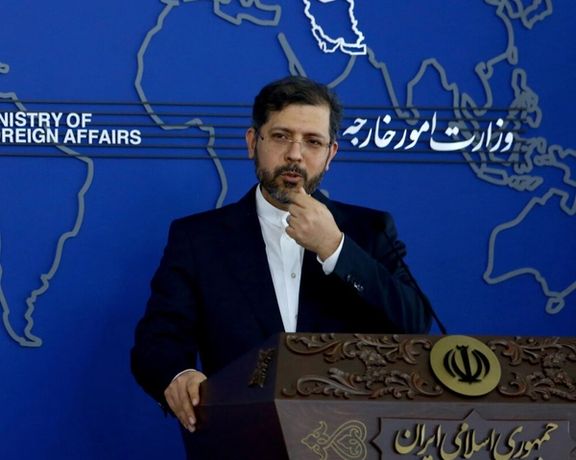Iran Says 'West Retreated' In Vienna Nuclear Talks

Iran's foreign ministry spokesman said Monday that Western nuclear negotiators in the Vienna talks have backed off from their "maximalist demands".

Iran's foreign ministry spokesman said Monday that Western nuclear negotiators in the Vienna talks have backed off from their "maximalist demands".
"If we have a shared text, it is because the Western side realized it had to back off from its maximalist demands. Today we witness the retreat, or I'd better say realism, of the Western sides in the negotiations," Saeed Khatibzadeh said in his press conference Monday morning.
Khatibzadeh reiterated that the West cannot have any demands other than those directly related to the nuclear issue and the 2015 nuclear deal, Joint Comprehensive Plan of Action (JCPOA) or lift the sanctions in a more limited way than they committed to in the deal. He reiterated that the window of opportunity to make a deal will not remain open forever.
Although it was clear from the beginning that the Vienna talks were focused on finding ways to restore the Joint Comprehensive Plan of act (JCPOA), the United States and its three European allies in the talks are also concerned about Tehran’s ballistic missiles and its interventions in the Middle East. There have been references in the past few months of the West asking Iran to agree to discuss these issues after the JCPAO talks, but Tehran has adamantly refused.
The stress on the Western side's "retreat" is apparently a reaction to the Iranian media's criticism of the negotiating team after the Russian envoy to the talks, Mikhail Ulyanov, said Russia and China had convinced Iran to back off from some of its "maximalist demands" in the last round of talks.
Nour News which is affiliated with the secretary of Iran's Supreme National Security Council (SNSC), Ali Shamkhani, Sunday admitted that Iran had dropped some of its previous demands but accused the media of misinterpreting the facts.
Russia's proactive role in the talks reflected by Ulyanov's quite frequent tweets and interviews, and photos of his meetings with the US Special Representative for Iran, Robert Malley, have become quite controversial in Iranian media and social media in recent weeks.
Many have criticized the Iranian negotiating team for conversing with the US side through the Russian envoy when they could directly negotiate with the US. Khatibzadeh responded to such criticisms by stressing that Iran and the US communicate through the European Union envoy Enrique Mora, the talks' coordinator, and exchange ‘non-papers’. "There have been no verbal messages."
The Russian envoy said on December 29 that the US and Russian delegations had "close consultations and coordination in the course of the Vienna talks" and called such coordination a prerequisite for progress towards restoration of the JCPOA. He also tweeted a photo of a meeting of all JCPOA participants, minus Iran, and the US.
"We have nothing to do with how 4+1 (France, Britain, Russia, China and Germany) communicate with the US, or whether they follow a shared mechanism or individual. We never ask them," Khatibzadeh said when asked about the Ulyanov-Malley meeting.
Khatibzadeh added that bilateral and multilateral talks among the participants in the talks are not unprecedented and not exclusive to the Russian team and attributed the attention drawn to Ulyanov and Russia's role in the talks to the extensive tweeting of Ulyanov whose posts are picked up by the press.
"The Russian envoy is very active in social media and has sometimes made statements that he [had to] correct two hours later," Khatibzadeh said.